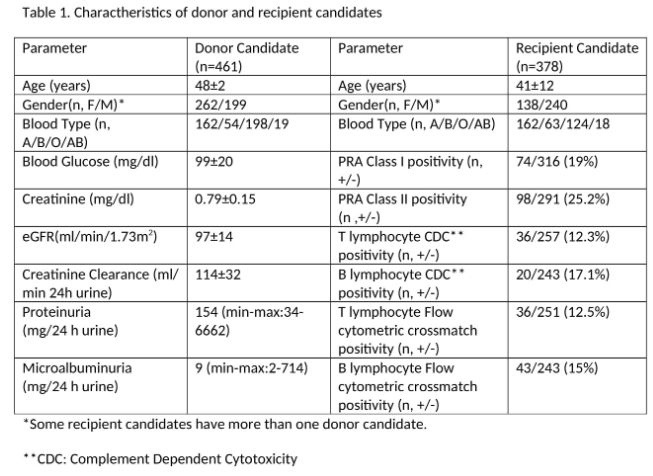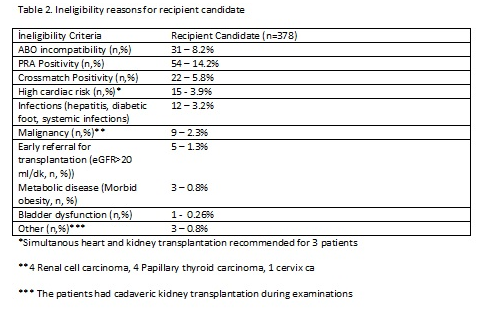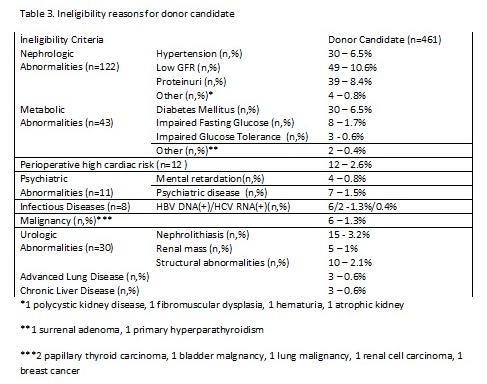Why can’t I have a kidney transplant? Limitations to donate kidney or to have allograft
Zeynep Kendi Celebi1, Siyar Erdogmus1, F. Nurhan Ozdemir Acar1, Ebru H. Ayvazoglu Soy2, Mehmet A. Haberal2.
1Nephrology, Baskent University, Ankara, Turkey; 2Transplantation, Baskent University, Ankara, Turkey
Introduction: Kidney transplantation is the treatment of choice in patients with end-stage renal disease(ESRD). Due to long waiting lists for cadaveric kidney transplantation, patients and their relatives are admitting to transplantation centers for living kidney donation.
Donor and recipient evaluation is a very important concern to prevent long term complications after kidney transplantation both for recipient and donor.
We evaluated both donors and recipients for ineligibility to kidney transplantation
Method: Between 2014-2020, the recipient and donor candidates who referred to Başkent University for kidney transplantation from a living-related donor were examined retrospectively.
All candidates are assesed for age, gender, blood type, cardiologic examination, psychiatry consultation, metabolic diseases, detailed biochemical and urinary examination. Recipient characteristics as etiology of renal disease, existing renal replacement therapy(RRT), immunologic parameters like panel reactive antibody and flow cytometric or complement dependent crossmatch were recorded.
Results: 740 recipient and donor couples who referred to our center for kidney transplantation were examined retrospectively. 276 couples had succesfully kidney transplantation and 461 couples were not eligible for kidney transplantation. 110 of 378 (29.1%) recipient candidates had previously been followed with chronic kidney disease at our nephrology clinic. The characteristics of donor and recipient candidates, who were not eligible for transplantation are given in Table 1.
The most common reason for declining transplantation was due to inappropiate donor characteristics (n=246, 53.3%). 98 recipient were declined for transplantation mainly due to immunologic reasons like PRA positivity and crossmatch positivity(n=54, 55.1%). 65 candidate(14%) refused kidney transplantation with their own will.
All reasons for ineligibility of donor and recipient candidates are given in tables 2 and 3.
Conclusion: The primary target in kidney transplantation is not to harm the donor. Through detailed investigations postoperative complications can be minimized after nephrectomy. A significant proportion of prospective living kidney donors were excluded due to medical reasons such as nephrologic problems like low GFR, high proteinuria levels, hypertension, blood glucose abnormalities, but the consent withdrawal of donor and recipient candidates were also a frequent reason, therefore, it is important to give detailed information before starting the examination.
Overall, significant variability remains among transplant programs in the criteria used to evaluate donors. These findings highlight the need for more data on long-term outcomes in various types of donors with potential morbidities related to donation.



There are no comments yet...
